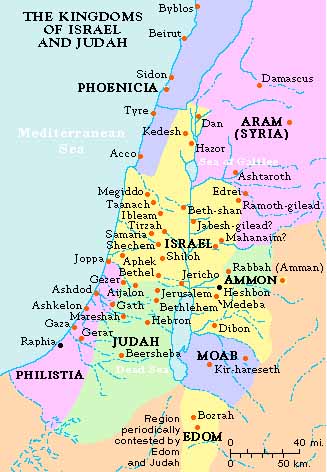|
Other Archaeological Sites / The Neolithic of the Levant (500 Page Book Online) Ancient Israelite History
Excerpts and Definitions and Addendums: ProofRead and Updated January 28th 2021
Note and Prologue: Doubtlessly confusing is the fact that (1) the Hebrew people under the patriarchs established Eretz Israel or the land given to them supposedly by God when they conquered the land of Canaan (hence Israelites); (2) the Kingdom of Israel (10 Northern Tribes: Capital Samaria) was deported by Assyrian King Sargon II east and scattered all over Mesopotamia where they lost their (religious) identity; (3) the later Neo-Babylonian captivity and deportation of political and religious leaders of the Kingdom of Judah (2 Southern Tribes: Capital Jerusalem) was more centralized in Babylon facilitating the continuation of their identity and religious beliefs and their eventual repatriation in Judea (hence Jews) ... Patriarchal Age: The story begins with the departure of Abram, a son of Terah, from Ur, his ancestral homeland in southern Mesopotamia circa 1950 BC. He journeys to Haran, a city in northwestern Mesopotamia and from there to the land of Canaan (Genesis 11:31-12:5). In Canaan Abram's son Isaac is born and Isaac, in turn, becomes the father of Jacob, also called Israel. During a famine Jacob and his 12 sons, the ancestors of the 12 tribes of Israel, leave Canaan and settle in Egypt, where their descendants become slaves (See *1 Below) ... Israel in Egypt: These Hebrews settled in the region of Goshen in the Nile Delta. Their proliferation and prosperity were perceived as a threat to Egyptian security. Drastic measures were introduced to curb the Hebrew population growth and they were pressed into corvée labour ..... The beginning of the exodus cannot be fixed with certainty at any particular time and most likely it involved the steady flow of Hebrews from Egypt over hundreds of years; probably peaking in the 12th century BC with the collapse and exhaustion of the two superpowers of the Near East - the Hittites and the Egyptians ... Settlement in Canaan (Judges Period) [Iron Age I Circa 1200-1000 BC]: During the century or so before the closing of the Bronze Age Canaan was organized politically into small city-states. Occasionally these city-states were clustered into small alliances; often they were in conflict with each other. The Hebrews were described as semi-nomads emerging from the desert fringes and as such would have been at a decided disadvantage when encountering the chariots and trained forces of Canaan's strongly fortified city-states. This disparity was compensated for by maximum use of (1) reconnaissance (2) clever strategems such as ambush and pre-emptive strikes and (3) the convenient recruitment of defectors ..... The earliest known reference to the existence of Israel is from the Merneptah Stele which verifies their presence in the central hilly country. The era of settlement in Canaan and the Judges ended and the transition into nationhood and the United Monarchy under Saul occurred during the priestly career of Samuel - the last of the Judges ... United Monarchy: The United Kingdom (1030-931 BC) was the moment of Israel's glory on the international scene. The impetus for its formation was the emergence of the Philistines in the Gaza Strip. An Ammonite presence also played a role in beginning an end to the loose tribal confederacy. Charismatic tribal leaders who arose as needed were no longer enough to lead the emerging nation. Under Saul the Israelite monarchy controlled a small and petty territory. Under David - and then Solomon - Israel was transformed into a larger unified kingdom with vassal states subject to it. Other powers - mainly Phoenicia and Egypt - were required to give due regard to Israel ..... Solomon's death circa 930 BC and the political errors of his son and successor Rehoboam led to the division of the monarchy into the kingdoms of Judah and Israel ... Divided Monarchy: The emergence of strongly centralized governments based in the capital cities of Samaria and Jerusalem and the growth of large regional centres such as Hazor, Megiddo and Dan in the north and Lachish and Beersheba in the south led to a highly stratified society ... Conquest of Israel: In 722 BC the Assyrians conquered Israel. They forced the ten tribes to scatter throughout their empire. One consequence of the Assyrian invasion of Israel involved the settling of Israel by Assyrians. This group settled in Samaria and they took with them Assyrian gods and cultic practices (See *A Below) ... Conquest of Judah: Judah barely escaped the Assyrian menace but would be conquered by the Chaldeans about a century later. King Nebuchadnezzar conquered Jerusalem in 586. The Hebrew Kingdom - started with such promise and glory by David - was now at an end ... Restoration Under the Persians: When Cyrus the Great (Achaemenid Dynasty) conquered Babylon in 539 BC the Persians succeeded Neo-Babylonia as the major imperial power of the Near East. The Achaemenid Persians presented themselves to their subject states as a benevolent power concerned with maintaing peace and order throughout their empire ..... The Cyrus Cylinder describes the policy of Cyrus of religious toleration which allowed subject peoples to return to their homelands. The Bible records a similar decree of Cyrus that permitted the Jews to resettle Jerusalem and rebuild their Temple (2 Chronicles 36:23 and Ezra 1:2-4) [See *1 Below] ... Rebuilding the Temple: There were successive waves of Jewish repatriation under Persian rule. The rebuilding of the Temple becomes a centerpiece of the Book of Haggai and First Zecchariah (Chapters 1-8) which presumes that this took place in the time of Zerubbabel (520 BC) ... Age of Hellenism: Alexander the Great changed the face of Judea along with the rest of the known world. In 336 BC he became king of Macedomia and of the Greek city-states conquered by his father (Philip II). Within a decade he defeated the Persians and fell heir to their empire. In 332 BC he conquered Judea ..... The Greeks were interested not only in military victories, political expansion and economic gain; thet were also committed to disseminating their way of life. In addition to political hegemony and imposition of taxes, Greek conquest exposed the eastern Mediterranean lands and beyond to Hellenism ...
Judas Maccabaeus and the Hasmonean Dynasty (142-37 BC): The Hasmonean rise to power was a long and arduous process that succeeded only after a 25-year struggle. Under the command first of Judah Maccabee the Jews attacked the Seleucid armies as they attempted to reach Jerusalem and reinforce the garrison there (See Antiochus IV and 1 and 2 Maccabees). Jewish sovereignty was lost to the Romans when Pompey conquered Judea in 63 BC ... Roman Domination: Some important subjects are (1) the Herodian Dynasty; (2) Christianity; (3) the Jewish Revolt; (4) the destruction of Jerusalem and the Second Temple in 70 AD and the end of Judaism - at least in Eretz Israel; (5) Masada ...
Library of Congress #DS 121 A53 1999
(*A) The Two Kingdoms (Jewish Virtual Library) Israel: An Archaeological Journey: Biblical Archaeology Society 2009 (PDF) 2.5 MB |


![Cyrus Cylinder (London (British Museum)) [LIVIUS]](http://www.livius.org/site/assets/files/3244/cyrus_cilinder.jpg)
